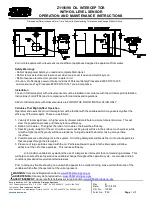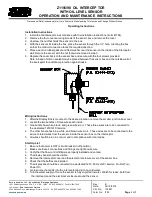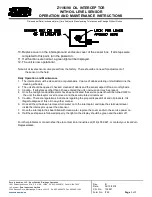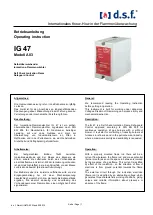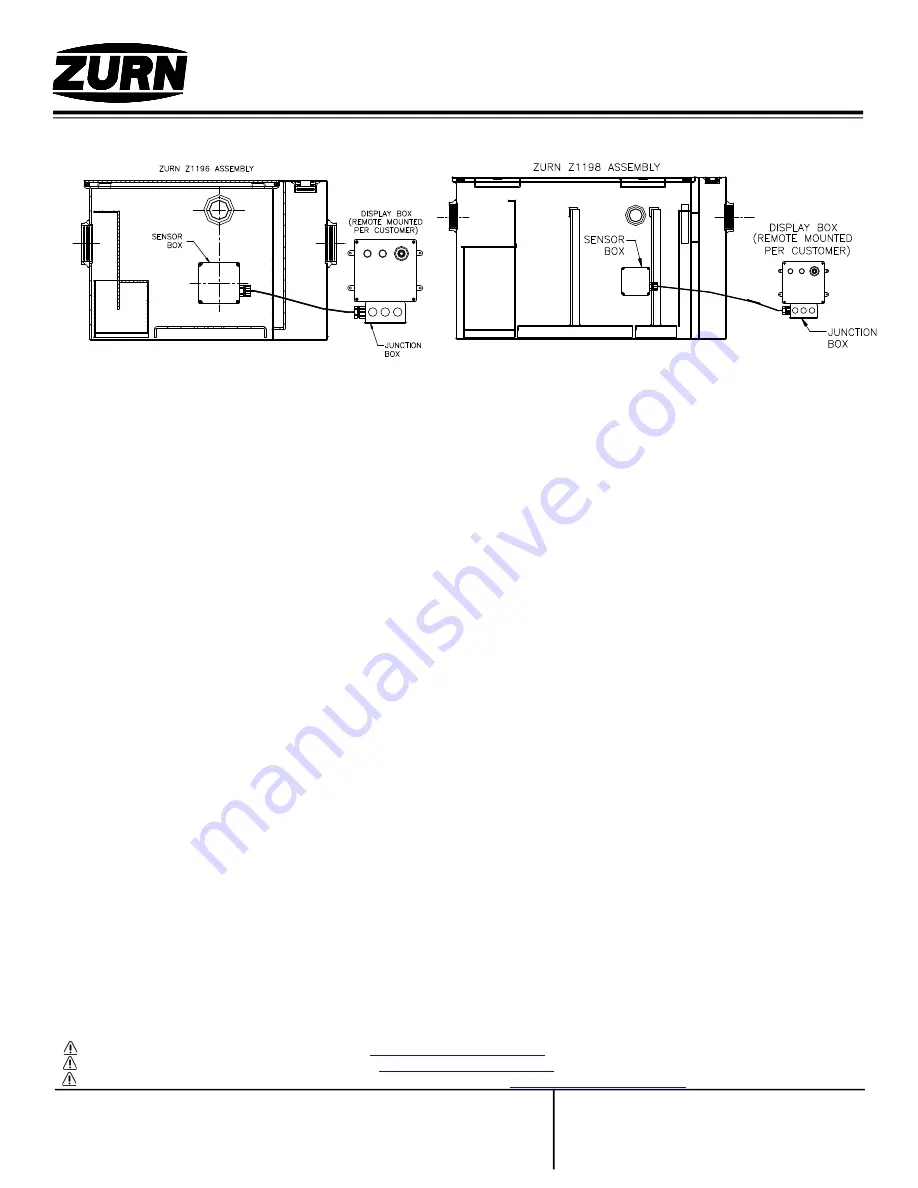
Z1196/98 OIL INTERCEP TOR
WITH OIL LEVEL SENSOR
OPERATION AND MAINTENANCE INSTRUCTIONS
Zurn Industries, LLC
|
Specification Drainage Operation
1801 Pittsburgh Avenue, Erie, PA U.S.A. 16502 · Ph. 855-663-9876, Fax 814-454-7929
In Canada
|
Zurn Industries Limited
3544 Nashua Drive, Mississauga, Ontario L4V 1L2 · Ph. 905-405-8272, Fax 905-405-1292
www.zurn.com
Rev.
B
Date:
04/10/2018
C.N. No.
139851
Form No. IT55
Page
1 of 3
®
Dimensional Data (inches and [ mm ]) are Subject to Manufacturing Tolerances and Change Without Notice
Zurn oil interceptors with oil level sensors are efficient appliances designed to separate oil from water.
Safety Warnings
• Do Not Apply power before you read and complete Start-Up list.
• Do Not remove electrical enclosure cover when main cover is open and electricity is on.
• Do Not expose electrical components to water or oil.
• Caution - Do Not apply power until all provisions of Personal Safety Procedure #29CFR 1910.335
and Lockout and Tag Procedure #29CFR 1910.147 are in Compliance.
Installation
The Zurn Oil Interceptors with oil level sensors must be installed in accordance with the oil Interceptor Installation
Instructions (Form #IT84) and in compliance with local codes and regulations.
All Zurn Oil Interceptors with oil level sensors are FOR ON THE FLOOR INSTALLATION ONLY.
Variables That Might Affect Operation
Operators and users of Zurn oil interceptors must be familiar with the variables which may adversely affect the
efficiency of the interceptor. These are as follows:
1. Velocity of Incoming Water...A higher velocity of water will contribute to a more turbulent mixture. This will
slow the separation process and thereby reduce efficiency.
2. Ratio of oil to water...The higher the ratio of oil to water, the lower the efficiency.
3. Specific gravity (weight) of the oil...Oil with a lower specific gravity will rise to the surface much quicker, while
oil with a higher specific gravity will have a tendency to linger toward the bottom, taking a longer time
to surface.
4. Possible presence of detergents in the system...Oil cutting detergents will break the oil into minute particles
that can pass through the interceptor.
5. Presence of large particles mixed with the oil...Particles allowed to pass into the interceptor will allow
adhesion of the oil to these particles. This reduces efficiency.
Job condition variables may warrant the use of a larger size interceptor than normal sizing indicates. This
will help to ensure efficient operation as variables change throughout the operation cycle. Local codes and job
conditions prevail and may warrant alternate sizes.
Prior to doing any trouble shooting on a unit which appears to be malfunctioning, make certain that none of the
variables which affect the operation of the unit are present.
WARNING
: Cancer and Reproductive Harm -
www.P65Warnings.ca.gov
ADVERTENCIA:
Cáncer y daño reproductivo -
www.P65Warnings.ca.gov
AVERTISSEMENT:
Cancer et effets néfastes sur la reproduction -
www.P65Warnings.ca.gov

